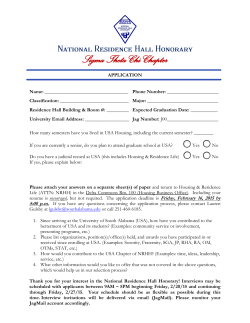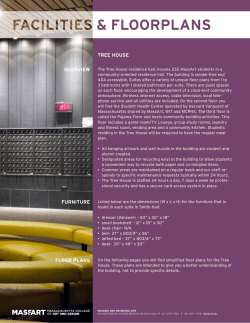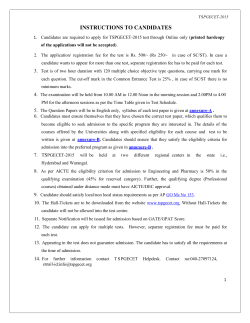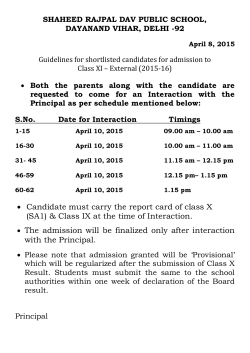
ASSOCIATION âRONDINE CITTADELLA DELLA PACEâ
ASSOCIATION “RONDINE CITTADELLA DELLA PACE” 2015-2016 APPLICATION FOR ADMISSION TO THE INTERNATIONAL HALL OF RESIDENCE Rondine Cittadella della Pace has been running one of the most significant and authentic peace programs in Italy for the last 15 years. In fact, since 1997 Rondine has housed the International Hall of Residence, made up of young students from different cultures many of whom have recently experienced situations of conflict in their home countries and who wish to participate in a project of peaceful co-existence, training and undergraduate or postgraduate study, witnessing the value of their experience of dialogue and reconciliation in different contexts. The aim of the International Hall of Residence is to facilitate the students’ return to their home countries, on completion of their studies, in order for them to foster, in their professional careers, the genuine possibility for dialogue, reconciliation and peaceful co-existence. Introduction The Association “Rondine Cittadella della Pace” placed in Arezzo, Tuscany, Italy, is currently recruiting young people who are interested in participating in the Association’s project, which includes: Participation in the intercultural and educational project: while the Association programmes specific initiatives in the field of personal and intercultural education throughout the year, the core of the educational project is the communal life organised within the International Hall of Residence. Here young students who come from the opposing sides of areas in conflict or of different cultures, are united by the same spirit, by the mutual knowledge that grows between them, over and beyond the obstacles that emerge over the course of their everyday lives. A 6 month course in Italian Language and Culture (3 months of intensive language lessons and a further 3 months language development and Italian culture). This course takes place at the International Hall of Residence in Rondine Cittadella della Pace. It is a preparatory course to enrolment in the student’s chosen undergraduate or postgraduate program. Participation in all the cultural activities organised by the Association, such as meetings with diplomats and experts on international relations, conferences in universities, presentations in schools, aimed to foster the value of the coexistence Enrolment in a 1 year postgraduate program (Master) chosen between the Public Universities of Florence, Siena, Pisa and Perugia. The chosen programs cannot be a fulltime course and must allow the student to take part to Rondine's activities. Information on the Italian university system can be found at www.study-in-italy.it. Examples of eligible fields of studies are: Social Studies (e.g. Economics, Psychology, International Relations), Humanities (e.g. History, Education, Literatures, Communication), Architecture, Natural Science. The only excluded Faculties are Law, Engineering and Medicine. An internal educational and training programme at the International Hall on the main topics related to Rondine’s mission (e.g., conflict transformation, peace-building, communication, leadership, educational skills, etc.) On successful completion of the whole programme the student will receive the “Rondine d’Oro”, as a sign of conclusion of the academic and training program will engage in a three months period of further activities and projects in Italy, as Rondini d'Oro, before returning to his/her home country, joining the alumni network “Rondini d'Oro League”. Eligible Candidates Recruitment is restricted to students between the ages of 21 and 26. Candidates must be able to demonstrate excellent academic achievement in their school programmes. Candidates must show a clear desire to overcome the negative consequences of conflict and hate; they must be open to dialogue and reconciliation, demonstrating this in their everyday relationships with the other residents living in the International Hall of Residence and in their capacity to inter-relate with the diverse cultures and faiths represented. Candidates must also be clearly determined in their intention to return to their home countries to embark on academic, institutional or industrial careers of high visibility, promoting the cause of dialogue and reconciliation. Recruitment The recruitment process for the International Hall of Residence involves the following stages, all of which must be successfully completed in order to be eligible for admission: Application forms are sent in by the deadline along with all relevant documents (see below); A list of suitable candidates is compiled, selected from the applications received; Candidates in the list are called to attend a selection day in his/her home country; Candidates chosen for admission are requested to arrive in Italy by the 30th of June, the program starting date. Candidates chosen for admission are invited to live for a trial period at the International Hall of Residence, Arezzo, Italy; On successful completion of the trial period (3 month: July, August and September), the candidate is officially admitted to the International Hall of Residence, otherwise he/she have to come back to the original country. To apply for admission it is necessary to fill in and send off the application form along with the copy of all relevant documentation (Attachment 1), directly to the Association Rondine Cittadella della Pace. It is also possible to hand your application to one of the Association’s local partners who will then send it on to the Association. Once all applications have been assessed and a list of suitable candidates has been drawn up, all those on the list will be called to attend a selection day (written or oral tests) which will take place in the candidate’s home country (otherwise in some particular case by Skype) in the presence of the examining committee on a specified day, time and place. During the selection interview the candidate can also provide further documentation to support his/her application. The selection day involves an interview to assess motivational and behavioural qualities. Technical and notional skills will not be assessed in the interview, but the applicant will be asked to give details on the project he would like to implement in his/her home country on completing his/her stay at the International Hall of Residence. This project will already have been included with the candidate’s application form. On its return to Italy the Examining Committee will present its assessment of candidates to the Selection Committee who will confirm each candidate’s eligibility for admission and will draw up a waiting list from which students will be chosen and invited to undergo the three month “trial period” at the International Hall of Residence (the waiting list remains valid for a period of two years). In Italy Candidates chosen for admission will have to reach Arezzo railway station under their own responsibility by the 30th June of every year. During the trial period (July, August and September) candidates will have the opportunity to assess whether the experience lives up to his/her expectations. At the same time the Association will assess whether the candidate is indeed suitable for permanent admission. Assessment will also be carried out on the basis of periodic interviews with the Hall of Residence staff. The trial period is regulated by a specific protocol which will be signed by the candidate on his/her arrival. Official acceptance of the candidate’s permanent admission to the Hall of Residence depends on the positive assessment of the Educational Team, which will be communicated at the end of the trial period. In the case of a negative assessment the candidate will be obliged to return to his/her home country. Official acceptance leads to the full and permanent admission of the candidate to the International Hall of Residence and the signing of the Hall of Residence Regulations. The student can lose his/her right to stay in the Hall of Residence at any time if Regulations are not respected. Master courses generally begin between October and February depending on different Universities academic year calendars. Costs All costs regarding the issuing of visas and the documentation necessary to the university preenrolment are the responsibility of the student, as is the preparation of any translation, authentication, or notarial deed required by the Italian authorities. The preparation and authentication of the documents necessary to enrolment in the Italian University is the responsibility of the student. He/She will provide all the required documentation, which must be checked with the Italian Consulate in the country of residence. The Association can provide help and advice on request of the student. After the selection process, according to the procedures of the different countries, students have to ask the competent Ministry of Education for the Apostille on their studies certificates. (Please note: the costs for apostille are the responsibility of the student). Travel costs to and from Italy are the responsibility of the student. During the trial period, all costs regarding board and lodging, university fees and study material (text, books, etc), including the course of Italian Language and Culture, are covered by the Association. During the student’s period of stay in Rondine, the Association covers all costs regarding board, lodging, transportation, all the expenses related to university studies (books, tuition fees), the costs of internal training courses of the International Hall of Residence, the activities promoted by the Association and medical assurance. Expenses under the responsibility of the student include: travel costs from and to his/her address, expenses for the travel and visa procedures (see below), holyday travels, personal expenses and every cost not specifically included in the expenses covered by the Association. Trips abroad or temporary return to student’s home country must be duly authorised by the Association. Any trips abroad are only possible after receiving a valid Italian permit of stay. Students cannot carry out paid working activity. As provided by the Italian Government, the Association will supply medical insurance for each student admitted. The Association will not cover costs for any previous diseases contracted before the arrival time in Italy. DOCUMENTS TO INCLUDE WITH YOUR APPLICATION FORM Deadline: 22nd March, 2015 To participate in the selection process it is necessary to fill in the form online: http://goo.gl/k8YGju or send the Application Form (Attachment 1), supported by all the documents mentioned below, by the deadline specified. (Applications will be considered in order of the date of delivery). The applicant is required to include a project he would like to implement once returned in his/her home country, on successful completion of Rondine's program. This project could be related to the students’ life plan, career plans or cultural interests that he/she wishes to develop. The presentation must include a description of the aims of the project and the various phases necessary to its realisation. All documentation must be sent scanned by e-mail or by fax to: E-mail: international.rondine@gmail.com Fax: +39.0575.353565 For Further Information: E-mail: international@rondine.org Web site: www.rondine.org Tel. +39.0575.299666 NOTE: The Association reserves the right to update the present application details, publicising any alterations on the web site www.rondine.org (only official source). APPLICATION FORM FOR ADMISSION (Attachment 1) General information: Name……………………………………….Surname……………….............. Male … Female Date of birth……….………..... Photo Place of birth……………………….…….…..Nationality……. ……………………… Ethnic background (where applicable)….………………………………..….. Address……………………………………………………………………..… Tel: home ……………………………………….…mobile. ……………………….…..……….……… e-mail……………………………………………….……………………………………………...……… Obligatory military service requirements absolved: Marital status: Married Single yes Children: yes no no Educational background: Latest degree obtained/expected……………………………………………………………….................. Date/Expected Date of award.………………………. ………………………………………................... Final result.................................................................................................................................................... At (name of University or other Institute)……………………….. …………………………………………………………………….............................................................. Field of Study…………………………………………………………………………………………...... Work experience: Are you currently employed? yes no If yes, what is your profession at the moment?........................................................................................... …………………………………………………………………………………………….......................... Briefly describe your past work experience…………………………………………………………………………………..................... …………………………………………………………………………………………………………… ……………………………………………………..................................................................................... Have you, or are you currently pursuing extracurricular activities? ………………………………………………………………....................................................... …................................................................................................................................................................... .................................................................................................................................................................... Additional information: Father’s name and surname…….…………………………………………… Profession…………………………………………………......................................................................... Date of birth……………………………….……..Address …………………………………………….……………..………..................... …………………. Mother’s name and surname………………………………………..……….............................................. Profession………………………………………..……..…. Date of birth…………..……………………………Address …………………………………………...... Where/ How did you find out about this application ……………………………..………………….…………………..……. …………………………………………………………………………………………………………… ………………………………… I would like to be admitted to the International Hall of Residence Association Rondine Cittadella della Pace I have included the following documents: (tick all documents included with the application form) Copy of valid passport (must be valid until at least June 2016); Copy of last diploma obtained Declaration of family income (document issued by your local authority or other competent organisation. A self certification form is also accepted). Curriculum Vitae 2 references in support of my application (teachers, university professors, organisations, associations who have a knowledge of you and your work/study); Cover letter of motivation A draft of the project that I intend to implement on return to my home country at the end of my stay at the International Hall of Residence, of maximum 2 pages, with a 250 words abstract, including: o Objectives; o Detailed description; o Methodology (steps to the practical realisation of the project); Candidates who pass the selection process will be responsible for obtaining: Italian Entrance Visa for Study/University; Documentation necessary for Italian university pre-enrolment; Certificate of healthy and robust constitution Those who would like to drive in Italy will have to present an International driving license Any other documents specifically requested by the Association. I hereby declare to have read the entire application form and all its attachments. Date________________________ Signature ______________________________ REGULATIONS INTERNATIONAL HALL OF RESIDENCE - EXTRACTS - Attachment 2 The International Hall of Residence is based in the small village of Rondine, in the Tuscan country, overlooking the river Arno, 12 kilometres from the closest city, Arezzo, and 70 km from Florence. Each room sleeps two students, there is a common dining room and there are also several study areas as well as a computer room and a library. - Students living in the International Hall of Residence are, for the entire period of their stay in Italy, under their own personal responsibility. They are, however, committed to respecting the regulations and accepting and acknowledging the guidance of the Director, his/her team and the other members of the Association’s staff. - The student undertakes to actively participate in the life of the International Hall of Residence and accepts the educational principles of the project, helping to reach a high level of communal life, characterized by friendship, sincerity, trust, open – mindedness and the desire to improve. - Daily life is organised with the aim of providing maximum personal autonomy (cleaning, laundry, ironing) while sharing common tasks (cleaning, cooking, setting and cleaning tables, washing up and maintaining communal spaces such as bathrooms, sitting rooms, library, class rooms, kitchens). Residents are in principle expected to participate in social activities (sports, dinners etc.). - The student is committed to actively participate in all the various initiatives run by the Association, as agreed, on admission to the Hall of Residence. For instance, meetings with diplomats, experts and politicians, presentations and conferences in schools and universities, projects on specific areas of conflict. The specific program of the Educational Project is organized yearly. - Each student must agree his/her university course with the Director of the Hall of Residence in a detailed way. This course will be specific to each student and his/her results will be monitored and evaluated. Every student has to fulfil all the scheduled duties concerning attendance and tests, and he/she must reach an optimal level of performance. - Students cannot change their chosen course of studies or university. They cannot carry out paid working activity. - The student is committed to reaching an excellent knowledge of the Italian language. - The student can lose his/her right to a place in the Hall of Residence at any time as a result of his/her failure to fulfil the stipulated study requirements, lack of participation in the activities run by the Hall of Residence and the Association, or lack of adherence to the regulations. - Students are committed to returning to their home countries on completion of the programme, investing their knowledge, skills and experience within their home communities.
© Copyright 2025









